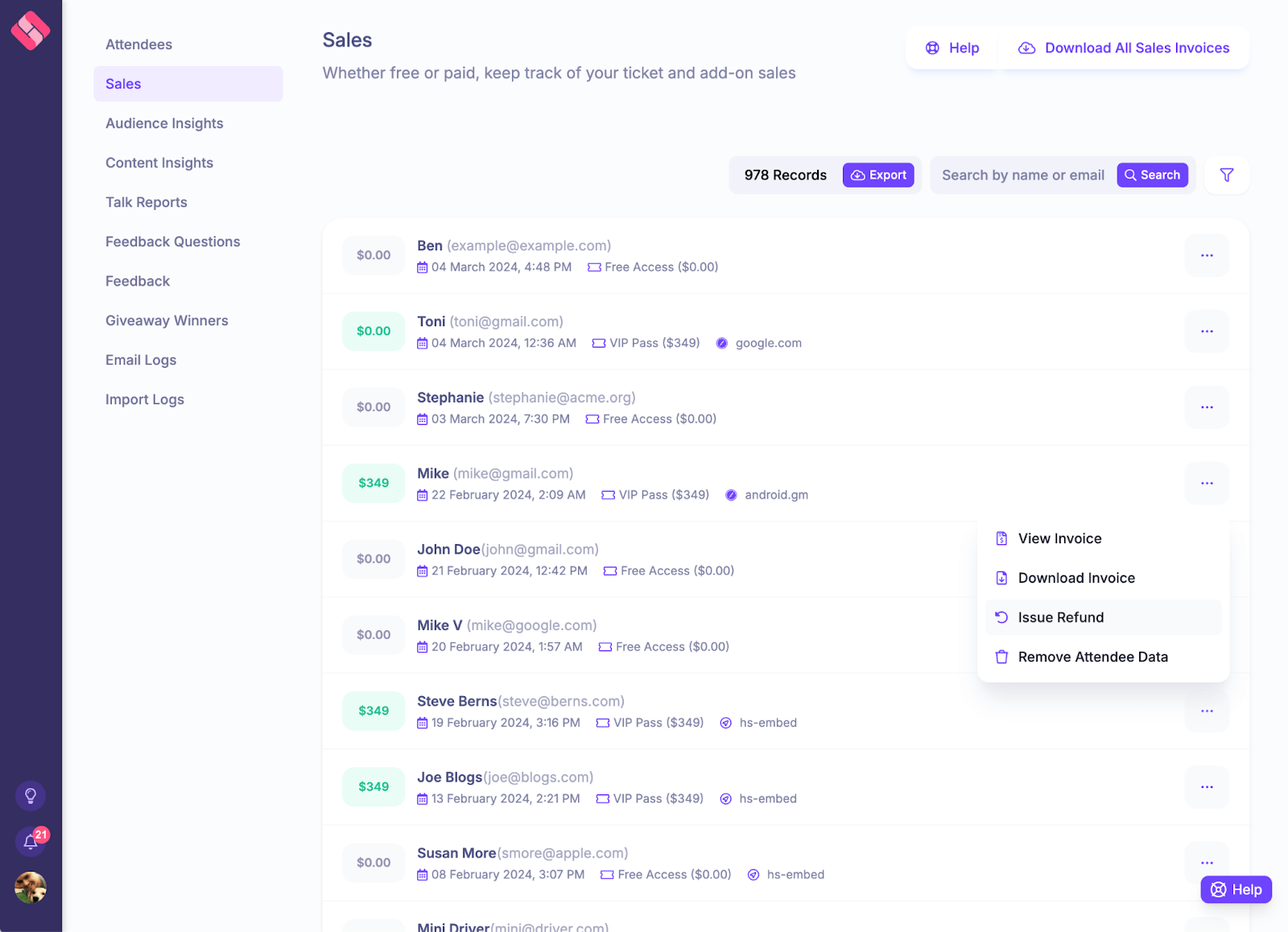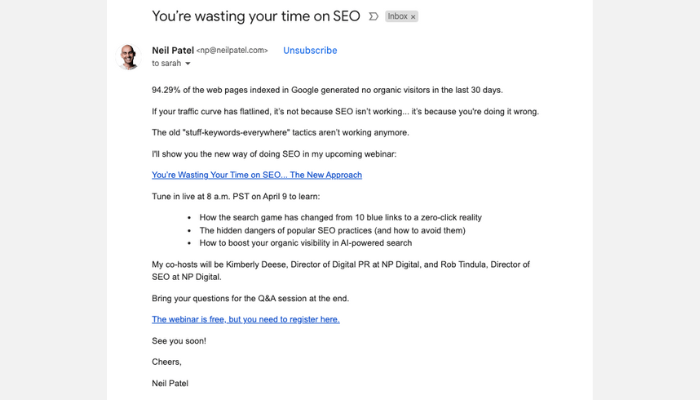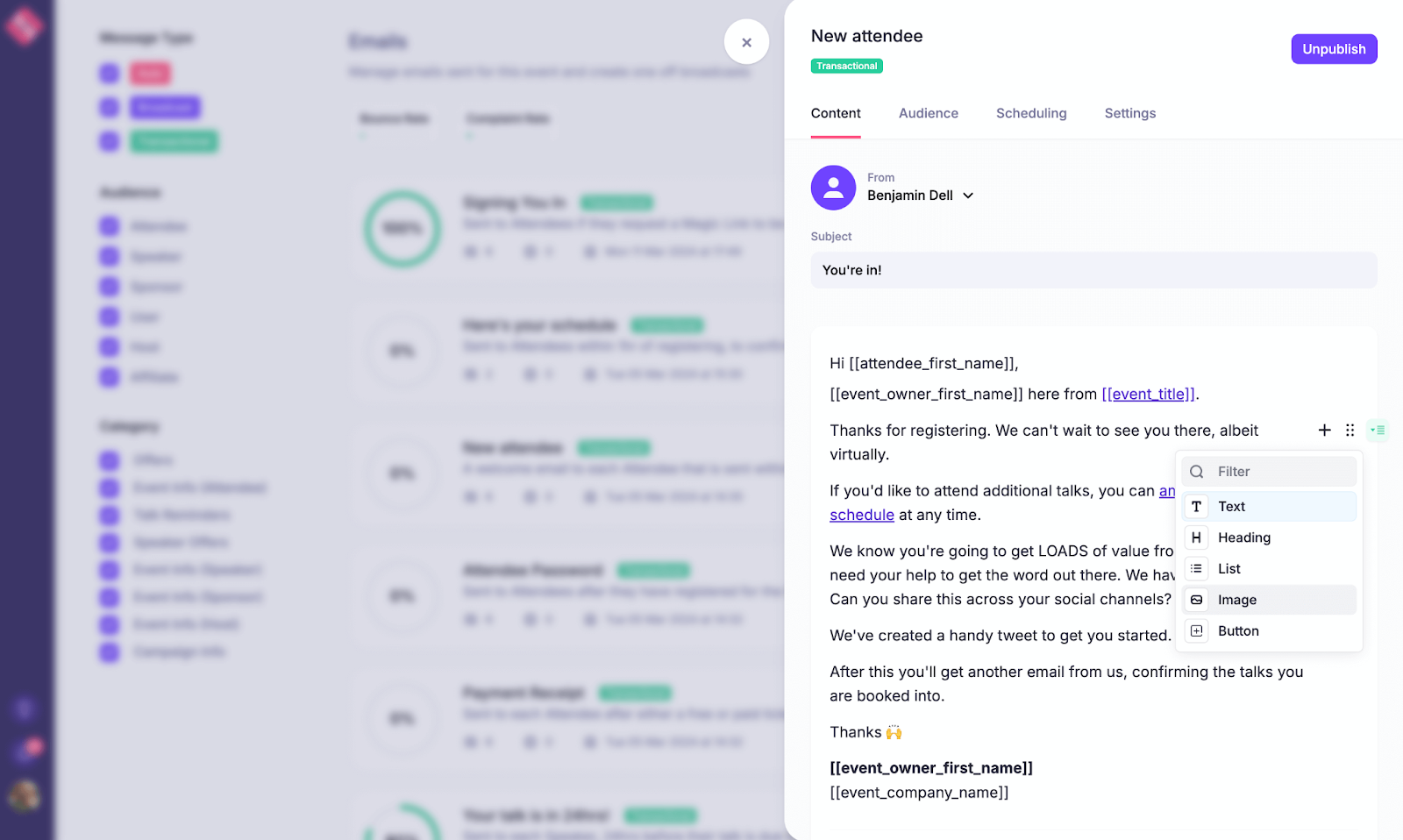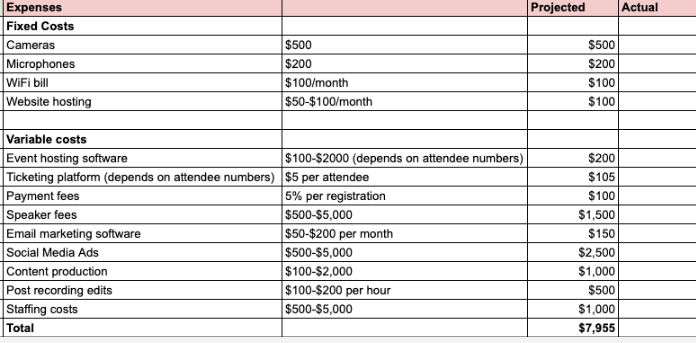How to Plan Your Virtual Event Budget in 5 Easy Steps (Bonus: Downloadable Template)
Sarah Wisbey
Content Contributor, HeySummit
Since 2020, a shift to virtual events has meant that 40% of business events now take place online. There’s no sign of this trend slowing down, with virtual and hybrid events set to outnumber in-person events in the next decade.
Hosting your event online means more people can attend from across the globe, and you can significantly reduce your costs compared to an in-person event.
So, you’ve decided that hosting an online event should become part of your marketing strategy, but how do you decide what to spend and how to budget for that event?
If you’re new to online event budgeting, we’ve got you covered. With our easy-to-use virtual event budget guide and downloadable virtual event budget template, you’ll be running profitable online events in no time.
What Is a Virtual Event Budget?
A virtual event budget is a vital part of the event planning process. When you design your online event, you need to know how much you will spend on every aspect of the process.
From platform costs to marketing, event promotion, and content creation, planning ahead and having a budget upfront will ensure you run a successful event that makes returns for your business.
Why You Need to Set a Budget for Your Virtual Event
When you clearly define your virtual event budget, you can make informed decisions, correctly allocate resources, maximize revenue, and maintain a clear overview of the event costs throughout the process.
Some other important reasons to set a budget when virtual event planning include:
A Budget Ensures You Allocate Funds Effectively
When you plan your virtual event, you want to make sure you allocate your spending in the most efficient way possible.

For example, there’s no point in spending 90% of your budget on ads and marketing for your event but not allocating anything to the content and execution of the event; this sets you up for failure.
Imagine you get hundreds of sign-ups thanks to your big marketing spend, but low-quality speakers and a lack of compelling event content cause a low audience interaction, engagement, and churn rate.
The bottom line is that spending that way won’t reflect well on your business, create revenue streams, or drive people to interact with you again.
Poor production, clunky transitions, and a lack of creativity in your virtual events are all reasons people will leave them. If you want a successful virtual event, you must allocate enough of your budget to making these areas professional and polished.
We’ll dive deeper into the percentage of income to allocate per category in our template below.
You Can Project Revenue Outcomes
With a clear overview of your event budget, you can assess whether the event will be financially viable.
You will keep a record of your expenses and have a clear overview of where the revenue generated is coming from. If your income is less than your expenses, consider considering your revenue streams and how to diversify them.
By recording every possible expense and income, you can easily see whether or not your event will be profitable. This can also help you with strategic decision-making. If you see the event's outcome will not be worth your time investment or cover expenses, you may decide to cancel it.
Avoids Overspending

Overspending on big projects is quickly done. Unpredictable last-minute changes and unforeseen problems can lead to rising expenses that push you over your corporate event budget.
Creating a budget with a buffer and wiggle room for error is incredibly effective for keeping spending within budget and quickly noticing unnecessary expenses that can be cut. Keeping a close eye on the numbers will help contribute to the financial success of your event.
Event Budgets Help Reduce Risks
Constant oversight of your event spending helps you predict and avoid any potential risks.
When you create an accurate budget, you’ll know how many ticket sales you need to break even and determine a realistic ticket price. This will help you allocate your marketing budget accurately to reach your event goals.
With a well-planned budget, you’ll also have money aside for unforeseen circumstances and unexpected expenses, such as technical issues that need to be solved at the last minute.
A contingency fund can give you peace of mind about delivering your event without glitches.
Build Positive Relationships With Your Stakeholders
If you have partners or sponsors involved in your event, they’ll want clear communication about where their money is being spent. A carefully planned budget will help you easily communicate with your partners and, in turn, help you build trust and a positive relationship.
It helps ensure you’re all on the same page about where to allocate your event budget.
The accountability and trust that a well-defined budget creates are very important for your reputation, especially if you want to work with the same partners on future projects.
Allows Accurate Reporting
After your virtual event, you’ll want to assess what went well and how you can improve for next time. Your budget will make it simple to get a quick overview of your event’s financial success and report back to other team members.

Hint: a virtual event platform like HeySummit makes it easier than ever to run virtual event reports and get an overview of your cash flow.
How to Define Your Virtual Event Budget
Now that you know the importance of setting a budget for your virtual event, let’s examine how to create one. Here are the five easy steps to take:
1. Set Goals for the Virtual Event
When determining your virtual event budget, a great starting point is to consider why you want to host this event.
Some top reasons for hosting virtual events:
Brand awareness
Lead generation
Asserting your authority/expertise
Helping your audience identify problems
Product sales
Raising awareness about a topic relevant to your business
To educate your audience
To build your online community
Giving your audience a chance to interact with you in a live setting
Collaboration with a prominent speaker or brand in your industry
Once you know why you want to host your event, prioritize those goals so you can create an event budget strategy.
Here’s an example of a virtual event invite from SEO expert Niel Patel:

Here, his primary goal is to educate his audience, but the secondary goal is for people to recognize his expertise from the webinar and employ his agency to help them solve their SEO troubles.
2. What Are Your Virtual Event KPIs?
Once you have clearly defined event goals, creating a marketing plan, attracting sponsors, and allocating enough budget to each of your key priorities will be easier.
Think about how you will measure your event’s success and which leading key performance indicators you’ll use.
Will you measure the success of your event by the number of attendees, tickets sold, or email list sign-ups post-event? When you clearly define how you’ll measure the success of your goals, it will be easier to allocate your budget to the right activities.
3. Estimate Your Revenue Sources
How will you generate revenue for your event? Remember that 80% of virtual events are free and used as marketing tools rather than revenue generators.
You may need to allocate some of your existing marketing budget to pay for the event if you don’t want to charge event attendees.
Other ideas for virtual event income generation include:
Ticket sales
Sponsorship
Partnerships with other brands
Community membership fees
Product sales
Donations (more relevant if you’re a non-profit organization)
Keeping track of your income for the event will allow you to determine variables such as ticket prices and a minimum number of attendees to make your event financially viable (if you’re using your event as an income generator).
4. Identify Your Key Expenses
When figuring out your virtual event pricing tier, you’ll want a rough idea of the key expenses. What are your most significant costs, and how can you minimize them?
Some main expenses for a virtual event will include:
Virtual event platforms and other software
Marketing costs
Staffing costs
Virtual speakers
Tech such as microphones, lights, speakers, green screens, cameras, etc.
Virtual event production on event day
Content production
Define your fixed costs vs. your variable costs: which costs will change based on the number of attendees, and which costs stay the same? That way, you’ll be able to plan for how many people you need to attend to break even.
5. Create a Virtual Event Marketing Plan
Without effective event marketing, there would be no attendees and, therefore, no event! A solid event marketing strategy is a big part of managing your event budget.
How will you attract people to sign up for your event? What tools will you use to ensure their attendance after they sign up? How can you keep them engaged and enter into your sales funnel?

Hint: An all-encompassing event-hosting platform like Hey Summit can help you send email reminders and engage your sign-ups before and after the event. Easy-to-use templates with proven conversions take the hassle out of writing communications yourself.
Other things to think about for your event marketing budget:
What will be the maximum per head you want to spend on event registration?
What’s your ideal CPC (cost per click) if you want to run ads to promote the event?
How can you collaborate with your virtual speakers to get free promotion for the event?
Virtual Event Budget Example
Considering all the above mentioned costs, here is an event budget example based on 100 attendees at your virtual event.

It’s a simple Google Sheets document that includes income and expenses, fixed and variable costs, and a column for entering your actual budget so you can compare it with your projections.

As you can see in this example, the most significant portion of the budget will go to event promotion and speaker fees. These are the two most essential elements of a virtual event! Getting people to attend and having high-quality event content will make your event successful.
Virtual Event Budget Template
If you want to use this event budget template for your future events, you can download a copy of it here.
How Can You Minimize Your Virtual Event Costs?
If you want to save money on your next event, consider an event software platform that offers everything you need to run virtual and hybrid events.
From a landing page builder, ticketing, and speaker dashboards to email marketing, event production, post-event analytics, and more, a platform like HeySummit gives you all the tools you need to run a successful event at an affordable price.
Our powerful software takes the load off event planners while positively impacting your virtual event budget.
You can get started for as little as $39. Claim your 14-day free trial here and start running events that keep your audience engaged and grow revenue for your business.
Table of Contents
What Is a Virtual Event Budget?Why You Need to Set a Budget for Your Virtual EventHow to Define Your Virtual Event BudgetVirtual Event Budget ExampleVirtual Event Budget TemplateHow Can You Minimize Your Virtual Event Costs?Try HeySummit free
HeySummit is the easiest way for creators and educators to grow their audience, authority and revenue with professional online events created in minutes, not weeks.
Share this article on:
Recent Posts
Loading feed...